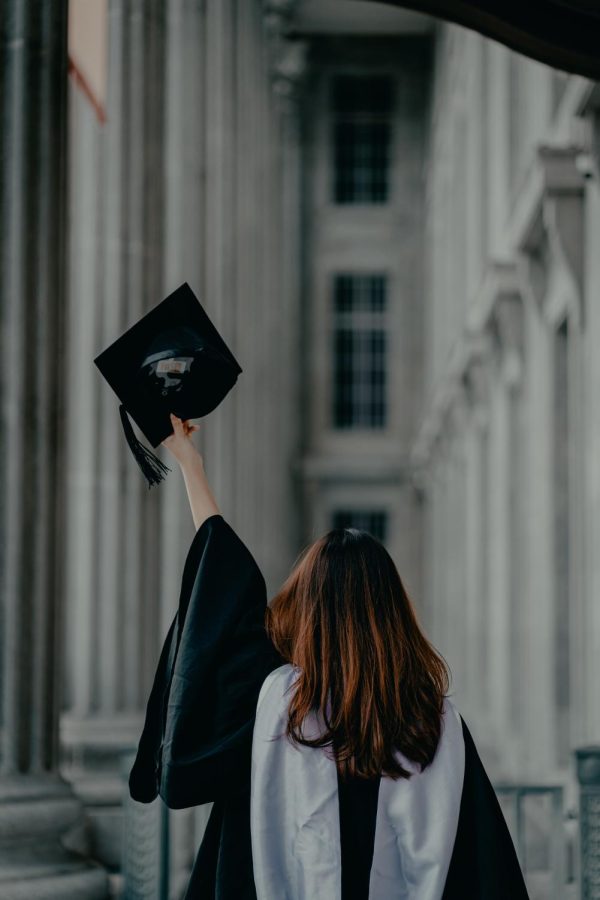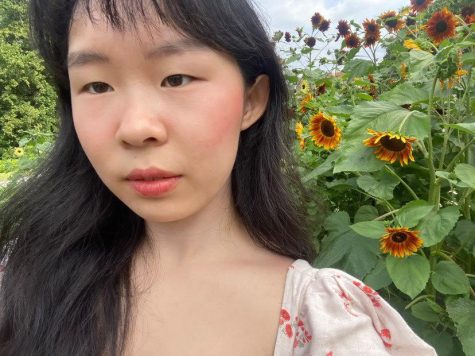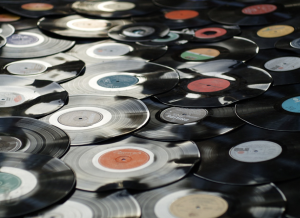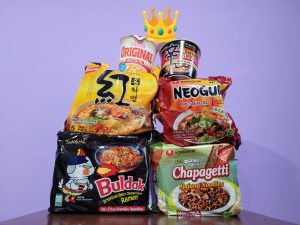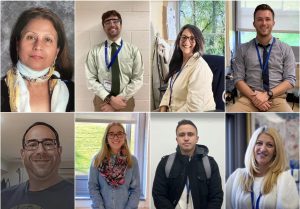Fighting the Fire
June 13, 2023
A day after Great Neck South’s Class of 2022 graduation, I woke up bright-eyed and well-rested—until, not a minute later, was immediately assaulted by “BREAKING: Supreme Court Overturns Roe v. Wade.” The next week on social media, my peers’ bright blue caps and sunny smiles blended with pictures of weeping protesters and pictographs of states where abortion would soon be banned.
I couldn’t do anything that day. I rolled around in bed thinking, how do you celebrate proceeding into a world like this?
Almost a year later, I have crumbs for answers. My graduation is less than a month away, and I wonder what will happen the day after. Will another basic human right be up for interpretation? Will another earthquake erupt? Will another bank collapse?
High school wasn’t the heroin-chic coming-of-age story that movies glamorize. In the past four years, I’ve spent hours wishing my body was mine, wishing I could mutate into a happier and less imperfect version of myself. I’ve questioned how it is fair to the human body to have to sustain this much grief. How after every school shooting, hate crime, or act of police brutality, the government pitches its promises, but another happens in two weeks. How many children or people of color have to be murdered for politicians to help pass effective legislation instead of sending their “thoughts and prayers”?
—
During fifth grade, my teacher kept playing Billy Joel’s “We Didn’t Start the Fire,” which at the time, was nothing more than background music for 10-year-olds practicing fraction multiplication.
In “We Didn’t Start the Fire,” Joel recounts the significant events that have occurred since 1949, the year he was born, until 1989, the year he turned 40.
In the chorus, Joel repeats, “We didn’t start the fire / It was always burning / Since the world’s been turning…No, we didn’t light it / But we tried to fight it.”
Now, in 2023, thirty-four years after the song was released, the lyrics rage in my mind. No one “started” or “lighted” the series of unprecedented events, but not everyone seems to want to alleviate them, extinguish the fire.
Some days, if someone were to ask me how I would define America, I would say: a cycle of wildfires and drought.
—
High school was, in large part, a rat race. As much as I love my passions, I felt like I had to commodify them, maneuver them to become something more. It would never be enough to write for the sake of writing well. I had to win an international competition or publish in a journal alongside writers with doctorate degrees.
As much as I respect many of my peers, I can’t help but roll my eyes when some of them build nonprofits they abandon the minute they receive a letter of admission.
Has goodwill been corrupted into the quest for prestige or servility under pressure?
Why has manufacturing an identity become normalized in our most pivotal developmental years?
Does anyone really, genuinely, care about the world?
What if our trying to stop the fire isn’t enough? And the fire inflames everything?
—
I vividly remember the day that Russia invaded Ukraine. It was February break. I was in Jamaica. I went to some pool-resort-beach place. I wore a purple wrap dress. The bus driver made some joke about taking us to a weed plantation where he works his second job.
All day, everyone stayed working, playing, sleeping, drinking. Children splashed around in their neon swimsuits. A man in dark blue shorts told a woman he predicts Ukraine will be like Vietnam, and she just nodded.
I wondered if it’s biological to become numb to pain. If grief is another inherited trait.
—
What if I don’t want to inherit grief?
Is it naive to want to live without the hurting? The burning?
Am I too sensitive to be a good American?
—
During two college admissions interviews, the interviewers asked, “How do you evaluate your role in achieving change? How do you evaluate art’s role in achieving change?”
I string some words together about the Harlem Renaissance, about Claes Oldenburg, about Maya Lin. Art prolongs emotion. Art prolongs memory. It can make the viewer feel deeply enough to cause them to act or to think differently about an issue.
In reality, I have no idea. I swear half of America wouldn’t open a book or attend an event with an opposing viewpoint. I swear there are people and politicians without the gene to feel.
I wish I could heal the world.
I wish I never believed a faceless, undercaffenaited college admissions officer determined my future success.
—
In a little more than two months, I’ll be living and studying in a much more artistically-rich and diverse environment—one which would propel me, if I play my cards right, to make more than my parents shortly after graduation.
And yet, I still feel the dread of choosing between conforming to a conveyor belt that will transport me to a lifeless career or, on the other hand, chasing an ambition that will lead me down a labyrinth of unanswered questions and instability. I’m reminded of the guilt I would feel doing nonprofit or grassroots organization work or making art with no or little return on investment of the cost of my college education.
What is my role in achieving change? What is anyone’s?
Why is it that the burden of change is placed on every nascent generation?
—
In May, when the sun forgives us and decides to share her light, I immediately become more hopeful. The truth is I’ve been offered more kindness than I deserve. I’m not inconsolable yet to see little fires everywhere. In fact, I’ve found that the greater the fire grows, the harder many people will fight to contain it. In the past year especially, I’ve felt honored to know people who astound me in their selflessness and strength.
Maybe, even as the fire blazes, it will reflect in our eyes or scorch us just enough so that we place some personal responsibility in fighting it. So that we purpose the fire into fuel.
—
High school wasn’t the heroin-chic coming-of-age story that movies glamorize. But it wasn’t any less metamorphic or melodramatic. In the past four years, I’ve laughed with my friends about the most silliest things—how we’d do parthenogenesis if we still can’t find boyfriends in college, how we’d rather be witches than werewolves, how even as the world keep blazing, all we want is a nice nap and a sweet treat.
I’ve cherished the intangible bond that formed in my English or AP World classes when everyone was staying up at 2 AM finishing homework. I’ve believed that there is good in the world, and found that there is, when my chemistry teacher agreed to let us retake a test after the class rallied about how badly we did. When classmates I’ve rarely spoken to help me with missing assignments. When Sahar Tartak, despite our ideological differences, invited me to breakfast and then to her wedding. When no one in my AP Government class can come up with a logical and secular explanation to why abortion should be outlawed.
And finally, in my questioning and aching, I’ve decided that above a test score, above my college admissions officers, above any supposed determinant of my future, the person most worth believing in is myself.
—
The day after my graduation, I will sleep a full eight hours, hopefully more. I will wake up and eat breakfast. The world has been burning, and it will keep burning.
But through the flames, there are kaleidoscopes of kindness. There are rows of skyscrapers that stand erect. There are people who inspire us, who refuse to admit that the fire is or will ever be too large or too hot.
We didn’t start the fire. It was always burning, since the world’s been turning. But when we are gone, it will still burn on, and on, and on, and on.


